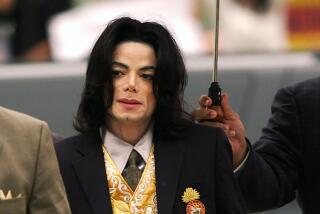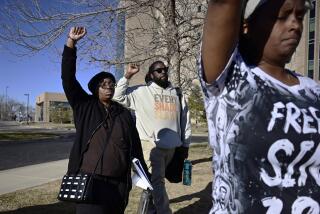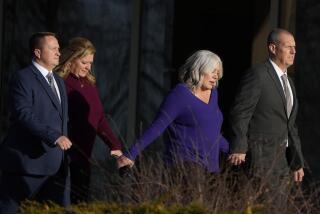Jackson begged for ‘some milk,’ Murray says in recording
Jurors in Dr. Conrad Murray’s manslaughter trial heard Friday directly from the mouth of the accused an account of what happened the night his celebrated patient died.
As he spoke to two detectives from the Los Angeles Police Department, Murray was composed and patiently explained the names of the drugs that he gave Jackson — the same drugs that would lead to his manslaughter charge nearly eight months later.
In the interview played in court Friday, Murray narrated over the clamor in an adjacent banquet hall the long hours during which he tried in vain to get Jackson to sleep on drugs other than propofol, the surgical anesthetic that ultimately caused his death.
Full coverage: The Conrad Murray trial
The doctor recalled: “4 o’clock came, and 4 o’clock went, and he was still awake. And then he complained, ‘I got to sleep, Dr. Conrad. I have these rehearsals to perform. I must be ready for the show in England.’ ”
After about nine hours of unsuccessful attempts with two different sedatives, Jackson began begging for the drug that the doctor suspected he had grown dependent on, Murray said in the interview.
“He said, ‘Please, please, give him some milk so that I can sleep, because I know that this is all that really works for me,’ ” Murray said.
“Hot milk or warm or just...” Det. Scott Smith began to ask, when Murray interjected: “This is just a medicine that he was familiar with, it’s called propofol.”
Murray said that by then it was already about 10:40 a.m., and he told Jackson he would need to wake up about noon. But Jackson persisted, the doctor told the detectives.
“He said ‘Just make me sleep, doesn’t matter what time I get up.’ ” the doctor said. “I agreed at that time that I would switch over to the propofol.”
Murray said that because of the other drugs he had given the singer throughout the night, he only administered half the dose he normally gave. In using the anesthetic, normally employed only in hospital settings, the physician told detectives he “took all precautions that were available,” including oxygen tanks and a pulse oximeter, which monitors heart rate and oxygen levels in the blood.
He said he left Jackson’s bedside for two minutes to go to the bathroom and he returned to find his patient wasn’t breathing. Jackson’s body was still warm and his color was the same, which led him to believe the singer had just stopped breathing, the doctor said.
Murray’s otherwise calm voice grew louder and excited as he described performing CPR and trying to get help. The doctor said he didn’t immediately call 911 because talking to the operator when his patient needed him would have been to neglect Jackson.
Murray’s account in the interview is contradicted by other witnesses, including a security guard, who said the doctor had him collect medicine bottles and an IV bag before asking him to call 911, and a paramedic, who testified that Jackson appeared long dead when he arrived.
Prosecutors have argued that evidence, including Murray’s phone records, shows the doctor lied about the events of that morning.
Murray told detectives that Jackson’s propofol use predated his care for the singer. He said he was surprised by Jackson’s “pharmacological knowledge.” The entertainer knew full well how the drug was to be administered, and said he liked to “push it” in himself, Murray said.
In the three days leading up to Jackson’s death, the doctor said, he had been trying to wean Jackson off the drug. Murray said repeatedly that he had grown to love Jackson as a friend.
Jurors heard about two-thirds of Murray’s interview before the court adjourned for the weekend. A transcript of the recording released Friday afternoon showed that in the remainder of the interview, Murray recounted talking to Jackson’s family at the hospital after the singer had been pronounced dead.
“His daughter uttered a lot of words of unhappiness, and you know, she will live alone without her dad and she didn’t want to be an orphan,” Murray said, according to the transcript. The doctor said he told Paris Jackson that he “tried my best.”
Full coverage: The Conrad Murray trial
“And she said, ‘I know that, Dr. Murray. At least I know,’ ” Murray recalled. “ ‘I know you tried your best.’ ”
More to Read
Start your day right
Sign up for Essential California for news, features and recommendations from the L.A. Times and beyond in your inbox six days a week.
You may occasionally receive promotional content from the Los Angeles Times.








